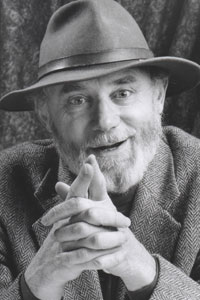by Jay O’Callahan
 Emily Dickinson was an artist who worked at her craft as we storytellers do. She worked with metaphor, cadence, rhythm, rhyme, character and shape. One critic called her a primitive in that she saw everything as if it was there for the first time. She can teach us about surprise and about the importance of searching for a brief phrase, a brush stroke that brings a moment alive.
Emily Dickinson was an artist who worked at her craft as we storytellers do. She worked with metaphor, cadence, rhythm, rhyme, character and shape. One critic called her a primitive in that she saw everything as if it was there for the first time. She can teach us about surprise and about the importance of searching for a brief phrase, a brush stroke that brings a moment alive.
In one poem she writes, “The moon was but a chin of gold.” A chin of gold is so much more interesting than a sliver of gold. She writes again about the moon saying,
Her Bonnet is the Firmament
The universe her shoe.
I can imagine when Emily wrote that line, “the universe her shoe” she might have jumped up, clapped her hands. She thought deeply and originally about life and yet she kept something of the joy of girlhood always with her. She searches for the word. She writes, “Night keeps fetching stars.” It’s that word “fetching” that is unusual and we’re glad she found it. Or “The wind tapped like a tired man.” Again we are surprised.
What I hope to do in the workshop is to work with “sparks”, simple words that evoke memories that are simply waiting to emerge. Those memories are often fresh and in them we find a brush stroke or a word or a metaphor that’s new.
Emily Dickinson’s flood subject was living and dying. She’s interested in all of life. Some of her verses are full of hard questions. Are her prayers heard? Is there life beyond the grave? “God’s Right Hand . . . / is amputated now / and God cannot be found –” She’s often frustrated, sad, hurt, yet writes a letter to Elizabeth Holland in October of 1870 that,
Life is the finest secret.
So long as that remains, we must all whisper.
Dickinson reminds us that ordinary life is quite amazing. And that is her subject. Again she writes, “Drama’s Vitallest expression is the Common Day.” What can be more common than news? There is always news. So a poem begins,
The Only News I know
Is Bulletins all Day
From Immortality.
That last line, “From Immortality”, is unexpected and not only surprises us, it enlarges us. It reminds us that there is something vast about this business of living.
In the workshop in addition to working with “sparks” and brush strokes, we’ll explore telling things at a slant. She writes,
Tell all the Truth but tell it slant –
Success in Circuit lies
And she finishes the poem
The Truth must dazzle gradually
Or every man be blind –
Dickinson challenges us to find the right word, to see life freshly, and to explore all of life through our art – storytelling.
About Jay
Jay O’Callahan takes a bare stage and single-handedly transforms it into a dynamic and sensitive world filled with compelling characters. He has performed at festivals and theaters throughout the world, including at the Olympics, and been applauded by the media, including The Washington Post and Entertainment Weekly. The Associated Press trumpeted him as “a theater troupe inside one body.” Time Magazine dubbed Jay “a genius.”
Jay has received numerous awards for his performances, books, and media and also is a regular contributor to National Public Radio. Don’t miss your chance to learn from him on this blog topic at the 2013 National Storytelling Conference, August 1-4, in Richmond, Virginia: www.storynet.org/conference.
Contact Jay
Website: www.ocallahan.com
Email:
